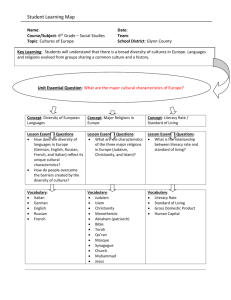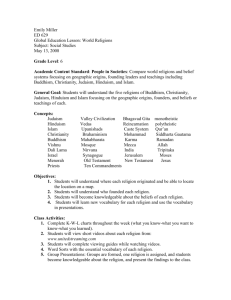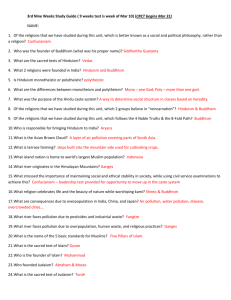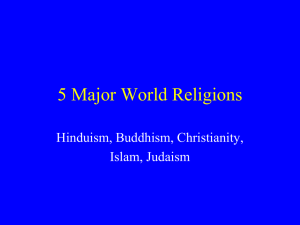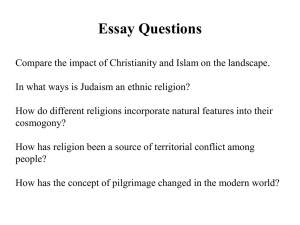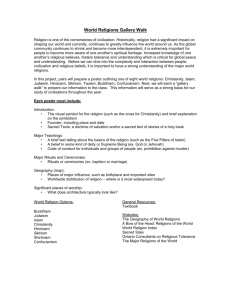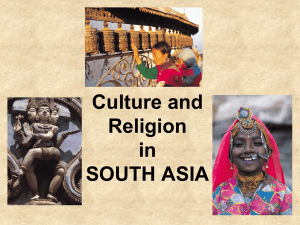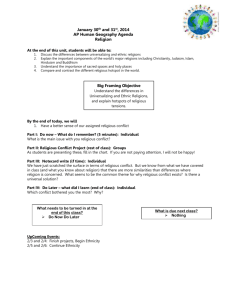World Religion Resources - Mr. Steve DuyckSparta Middle School
advertisement
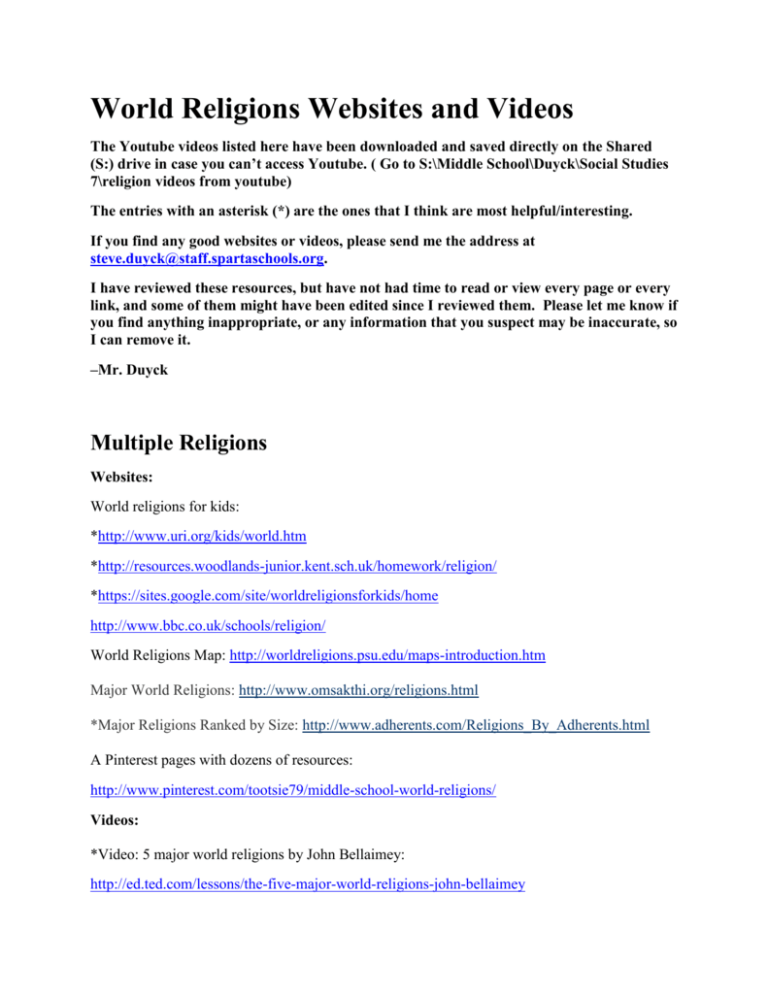
World Religions Websites and Videos The Youtube videos listed here have been downloaded and saved directly on the Shared (S:) drive in case you can’t access Youtube. ( Go to S:\Middle School\Duyck\Social Studies 7\religion videos from youtube) The entries with an asterisk (*) are the ones that I think are most helpful/interesting. If you find any good websites or videos, please send me the address at steve.duyck@staff.spartaschools.org. I have reviewed these resources, but have not had time to read or view every page or every link, and some of them might have been edited since I reviewed them. Please let me know if you find anything inappropriate, or any information that you suspect may be inaccurate, so I can remove it. –Mr. Duyck Multiple Religions Websites: World religions for kids: *http://www.uri.org/kids/world.htm *http://resources.woodlands-junior.kent.sch.uk/homework/religion/ *https://sites.google.com/site/worldreligionsforkids/home http://www.bbc.co.uk/schools/religion/ World Religions Map: http://worldreligions.psu.edu/maps-introduction.htm Major World Religions: http://www.omsakthi.org/religions.html *Major Religions Ranked by Size: http://www.adherents.com/Religions_By_Adherents.html A Pinterest pages with dozens of resources: http://www.pinterest.com/tootsie79/middle-school-world-religions/ Videos: *Video: 5 major world religions by John Bellaimey: http://ed.ted.com/lessons/the-five-major-world-religions-john-bellaimey https://www.youtube.com/watch?v=m6dCxo7t_aE&list=PLyTQFe4nDbl9HQuRFTrNdeJJYctC FL_ib Video: Video Timeline – World Religions Astonishing Facts: https://www.youtube.com/watch?v=JTZOjVwHr7A&list=PLyTQFe4nDbl9HQuRFTrNdeJJYct CFL_ib Hinduism Websites: Hindu Temples: http://www.hindunet.org/hindu_pictures/temples/temples.shtml Hindu architecture: http://www.touropia.com/amazing-hindu-temples/ http://hinduism.about.com/od/basics/p/hinduismbasics.htm http://www.religionfacts.com/hinduism/index.htm http://www.religioustolerance.org/hinduism.htm Hinduism History Timeline: http://www.religionfacts.com/hinduism/timeline.htm Videos: *Video: Crash Course on Hinduism & Buddhism: https://www.youtube.com/watch?v=8Nn5uqE3C9w *Video: Hip Hughes Hinduism & Buddhism: https://www.youtube.com/watch?v=kGUwKscC0tw Video: Chicago Police Department on Hindu religious beliefs: http://www.schooltube.com/video/e565e0882667424b8a64/Hinduism Video: Five misconceptions about Hinduism: https://www.youtube.com/watch?v=yp25I8f3gaY&list=PLyTQFe4nDbl9HQuRFTrNdeJJYctCF L_ib Video: Hindu temples: Get it from the Shared (S:) drive. Video: Hindu creation story: https://www.youtube.com/watch?v=Y9yWwFWpbRo Buddhism Websites: Buddhist Art and Architecture: http://www.buddhanet.net/gallery.htm Buddhist Festivals and Special Days: http://www.buddhanet.net/festival.htm A Brief History of Buddhism: Siddhartha Gautama: http://mcel.pacificu.edu/as/students/vb/history.htm Buddhism for teenagers: http://dhammadana.fr/en.htm Treasures of the World: Borobudur Temple: http://www.pbs.org/treasuresoftheworld/borobudur/boro_main.html Buddhism History Timeline: http://www.religionfacts.com/buddhism/timeline.htm Videos: These two videos are also listed in the Hinduism section: *Video: Crash Course on Hinduism & Buddhism: https://www.youtube.com/watch?v=8Nn5uqE3C9w *Video: Hip Hughes Hinduism & Buddhism: https://www.youtube.com/watch?v=kGUwKscC0tw Video: Ancient India Buddhism: http://www.schooltube.com/video/238013c3ec3f4a208980/Ancient%20India%20Buddhism Judaism Websites: Jewish architecture: https://www.google.com/search?q=jewish+architecture&source=lnms&tbm=isch&sa=X&ei=C9 VZU-SIL5CnyATa1ILAAw&sqi=2&ved=0CAYQ_AUoAQ&biw=1440&bih=785 Heritage: Civilization and the Jews: http://www.pbs.org/wnet/heritage/ Judaism 101: Synagogues, Shuls, and Temples: http://www.jewfaq.org/shul.htm Judaism: http://www.jewfaq.org/index.htm Judaism History Timeline: http://www.religionfacts.com/judaism/timeline.htm Videos: Video: Facts about Judaism: https://www.youtube.com/watch?v=KzCoWo2eYGA Video: Chicago Police Department on Judaism: http://www.schooltube.com/video/e8902fc7c3bf41a9adb3/Judaism%20The%20Chicago%20Police%20Department Christianity Websites: *Architecture in Russia: http://architecture.about.com/library/weekly/aa090501c.htm Christian architecture: https://www.google.com/search?q=christian+architecture&source=lnms&tbm=isch&sa=X&ei=n 9VZU-rpMYyayAS3iIHYDA&sqi=2&ved=0CAYQ_AUoAQ&biw=1440&bih=785 Frontline - From Jesus to Christ: The First Christians: http://www.pbs.org/wgbh/pages/frontline/shows/religion/ Christianity History Timeline: http://www.religionfacts.com/christianity/timeline.htm Videos: Video: What is Christianity?: http://www.schooltube.com/video/156b632615b14e5f9e33/What%20is%20Christianity *Video: Crash Course - Christianity from Judaism to Constantine: https://www.youtube.com/watch?v=TG55ErfdaeY&list=PLyTQFe4nDbl9HQuRFTrNdeJJYctC FL_ib Video: Crash Course on the Crusades (Christianity and Islam) https://www.youtube.com/watch?v=X0zudTQelzI&list=PLyTQFe4nDbl9HQuRFTrNdeJJYctCF L_ib Islam Websites: Islamic architecture: https://www.google.com/search?q=christian+architecture&source=lnms&tbm=isch&sa=X&ei=n 9VZUrpMYyayAS3iIHYDA&sqi=2&ved=0CAYQ_AUoAQ&biw=1440&bih=785#q=islamic+archite cture&tbm=isch Islam: Empire of Faith: http://www.pbs.org/islam/ Virtual Mosque: http://www.islamicity.com/ Taj Mahal: http://islamicity.com/Culture/Taj/default.htm Islam Historical timeline: http://www.religionfacts.com/islam/timeline.htm Videos: Video: Crash course Islam: https://www.youtube.com/watch?v=TpcbfxtdoI8 Video: The Basics of Islam: http://www.schooltube.com/video/266bab793403450392fc/The%20Basics%20of%20Islam Use this information to get you started. It should not be your only source of information. The Top Six World Religions: Buddhism - THE WHEEL OF DHARMA Buddhism is a set of teachings often described as a religion. Many recent scholars regard it as a plurality rather than a single entity. As with other religions, some Buddhists claim that Buddhism is not a religion. Some say it is a body of philosophies influenced by the teachings of Siddhartha Gautama, known as Gautama Buddha. Others say it is teachings to guide one to directly experiencing reality. Buddhism is also known as Buddha Dharma or Dhamma, which means roughly the "teachings of the Awakened One" in Sanskrit and Pali, languages of ancient Buddhist texts. Buddhism began around 5th century BC with the teachings of Siddhartha Gautama, who was born in ancient India, and is hereafter referred to as "the Buddha." Christianity - THE CROSS, THE HOLY BIBLE Christianity is a monotheistic religion centered on the life and teachings of Jesus of Nazareth as depicted in the New Testament. Christianity teaches that Jesus is the Son of God and the Messiah prophesied in the Old Testament, and that the New Testament records the Gospel that was revealed by Jesus. Christianity began as a sect within Judaism, and includes the Hebrew Bible (known to Christians as the Old Testament) as well as the New Testament as its canonical scriptures. Like Judaism and Islam, Christianity is classified as an Abrahamic religion. Hinduism - THE SACRED SYLLABLE Hinduism is a religious tradition that originated in the Indian subcontinent. Hinduism is often referred to as Sanātana Dharma by its practitioners, a Sanskrit phrase meaning "the eternal law". Hinduism is the world's oldest major religion that is still practiced. Its earliest origins can be traced to the ancient Vedic civilization. A conglomerate of diverse beliefs and traditions, Hinduism has no single founder. It is the world's third largest religion following Christianity and Islam, with approximately a billion adherents, of whom about 905 million live in India and Nepal. Other countries with large Hindu populations include Bangladesh, Sri Lanka, Pakistan, Indonesia, Malaysia, Singapore, Mauritius, Fiji, Suriname, Guyana and Trinidad and Tobago. Hinduism contains a vast body of scriptures. Divided as Śruti (revealed) and Smriti (remembered) and developed over millennia, these scriptures expound on theology, philosophy and mythology, and provide spiritual insights and guidance on the practice of dharma (religious living). In the orthodox view, among such texts, the Vedas and the Upanishads are the foremost in authority, importance and antiquity. Other major scriptures include the Tantras, the sectarian Agamas, the Purāṇas and the epics Mahābhārata and Rāmāyaṇa. The Bhagavad Gītā, a treatise excerpted from the Mahābhārata, is sometimes called a summary of the spiritual teachings of the Vedas. Islam - THE CRESCENT MOON, THE QUR’AN Islam is a monotheistic Abrahamic religion originating with the teachings of Muhammad, a 7th century Arab religious and political figure. The word Islam means "submission", or the total surrender of oneself to God (Allah). An adherent of Islam is known as a Muslim, meaning "one who submits (to God)". There are between 1.1 billion and 1.8 billion Muslims, making Islam the second-largest religion in the world, after Christianity. Muslims believe that God revealed the Qur'an to Muhammad, God's final prophet, and regard the Qur'an and the Sunnah (words and deeds of Muhammad) as the fundamental sources of Islam. They do not regard Muhammad as the founder of a new religion, but as the restorer of the original monotheistic faith of Abraham, Moses, Jesus, and other prophets. Islamic tradition holds that Judaism and Christianity distorted the messages of these prophets over time either in interpretation, in text, or both. Islam includes many religious practices. Adherents are generally required to observe the Five Pillars of Islam, which are five duties that unite Muslims into a community. In addition to the Five Pillars, Islamic law (sharia) has developed a tradition of rulings that touch on virtually all aspects of life and society. This tradition encompasses everything from practical matters like dietary laws and banking to warfare. Almost all Muslims belong to one of two major denominations, the Sunni and Shi'a. The schism developed in the late 7th century following disagreements over the religious and political leadership of the Muslim community. Roughly 85 percent of Muslims are Sunni and 15 percent are Shi'a. Islam is the predominant religion throughout the Middle East, as well as in parts of Africa and Asia. Large communities are also found in China, the Balkan Peninsula in Eastern Europe and Russia. There are also large Muslim immigrant communities in wealthier and more developed parts of the world such as Western Europe. About 20 percent of Muslims live in Arab countries. Judaism - THE MENORAH, THE STAR OF DAVID Judaism is the religion of the Jewish people, based on principles and ethics embodied in the Hebrew Bible (Tanakh) and the Talmud. According to Jewish tradition, the history of Judaism begins with the Covenant between God and Abraham (ca. 2000 BCE), the patriarch and progenitor of the Jewish people. Judaism is among the oldest religious traditions still in practice today. Jewish history and doctrines have influenced other religions such as Christianity, Islam and the Bahá'í Faith. While Judaism has seldom, if ever, been monolithic in practice, it has always been monotheistic in theology. It differs from many religions in that central authority is not vested in a person or group, but in sacred texts and traditions. Throughout the ages, Judaism has clung to a number of religious principles, the most important of which is the belief in a single, omniscient, omnipotent, benevolent, transcendent God, who created the universe and continues to govern it. According to traditional Jewish belief, the God who created the world established a covenant with the Israelites, and revealed his laws and commandments to Moses on Mount Sinai in the form of the Torah, and the Jewish people are the descendants of the Israelites. The traditional practice of Judaism revolves around study and the observance of God's laws and commandments as written in the Torah and expounded in the Talmud. Sikhism - THE KHANDA Sikhism, founded on the teachings of Guru Nanak Dev and nine successive gurus in fifteenth century Northern India, is the fifth-largest religion in the world. This system of religious philosophy and expression has been traditionally known as the Gurmat (literally the counsel of the gurus) or the Sikh Dharma. Sikhism originated from the word Sikh, which in turn comes from the Sanskrit root śiṣya meaning "disciple" or "learner", or śikṣa meaning "instruction." The principal belief of Sikhism is faith in Vāhigurū—represented using the sacred symbol of ēk ōaṅkār, the Universal God. Sikhism advocates the pursuit of salvation through disciplined, personal meditation on the name and message of God. A key distinctive feature of Sikhism is a non-anthropomorphic concept of God, to the extent that one can interpret God as the Universe itself. The followers of Sikhism are ordained to follow the teachings of the ten Sikh gurus, or enlightened leaders, as well as the holy scripture entitled the Gurū Granth Sāhib, which includes selected works of many philosophers from diverse socio-economic and religious backgrounds. The text was decreed by Gobind Singh, the tenth guru, as the final guru of the Khalsa Panth. Sikhism's traditions and teachings are distinctively associated with the history, society and culture of the Punjab. Adherents of Sikhism are known as Sikhs (students or disciples) and number over 23 million across the world. Most Sikhs live in the state of Punjab in India and, prior to the country's partition, millions of Sikhs lived in what is now the Punjab province of Pakistan.
